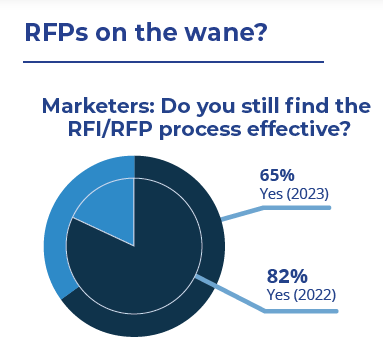The Dawn Of A New Golden RFP Age?
Are we at the dawn of a new golden RFP age where they fade to dust?
65% of marketers said the RFI/RFP is still effective, versus 82% last year.
Has the worm finally turned?
Undoubtedly not, but perhaps we’re finally seeing some cracks in the foundation.
A 17-point drop is significant.
It’s been a process seen (and is still seen) as more task-oriented rather than goal-oriented, inherently non-collaborative, and reactive rather than proactive.
And per the 4As and ANA, there remain issues with intellectual property retention, budget size, participant roles, and publicity of wins.
At RSW/US, as a general rule, we don’t chase RFPs for our agency clients, but we also don’t ignore them.
There are those verticals where an RFP must be released and answered, and certainly, some clients who have no issue answering an RFP if it makes strategic sense.
In order to dig deeper into the decreased effectiveness of the RFP process, we should look at a few new questions we added this year.
We asked marketers if they released more or fewer RFPs in 2023, and asked agencies the same question, in terms of RFP frequency.

Here’s what we found:
Reduced Agency Engagement
37% of agencies reported answering fewer RFPs in 2023 compared to 2022, and 41% said they answered the same amount.
Only 22% reported an increase.
This suggests a subtle, but noticeable shift in the agency approach toward RFPs.
Marketer Decrease in Releasing RFPs
From the marketer’s perspective, 50% reported releasing fewer
RFPs in 2023 compared to 2022, while 45% released the same amount. Only a small fraction (5%) increased their RFPs.
Both agencies and marketers are showing a trend toward fewer RFPs. This parallel movement suggests a mutual evolution in the industry’s approach to agency-client engagement.
And we asked a final question to agencies: How many RFPs did you answer in 2023? 45% reported answering 1-6, and 41% reported answering 7-10+. So while we see a decreasing trend overall for marketers and agencies, it’s still a driver for new business.
Bottom Line
The 17% drop in perceived RFP effectiveness coupled with fewer RFP releases from marketers indicates a potential growing skepticism or dissatisfaction with the RFI/RFP process.
This could be due to the increasing need for more collaborative, flexible, and goal-oriented approaches in marketing strategies between agencies and clients, rather than the standardized offerings typically found in RFPs.
In response, agencies should:
1) Reassess their reliance on RFPs for new business in 2024.
2) Be more strategic and selective in responding to RFPs, focusing on those that align well with their strengths and values.
3) Diversify business development strategies beyond RFPs, including some form of direct outreach, thought leadership content.
It’s the Dawn Of A New Golden RFP Age? Maybe?


